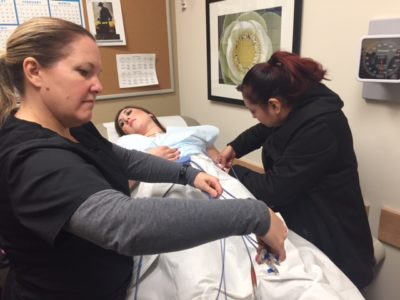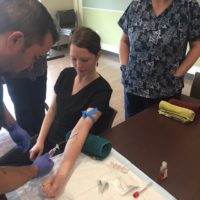Sharing and promoting the work of our regional collaboratives is extremely important. It is their hard work and effort that drives the engine that is the National Fund. Local Investment @ Work is a platform where regional collaboratives share stories about any successes, challenges, thoughts, or more about the important work they are doing locally.
Please be sure to stay up to date with all Local Investment @ Work updates by following our LinkedIn Showcase Page, as well as using #LIAW on social media.
 With demand for medical assistants (MAs) across Seattle and King County at an all-time high, UW Medicine, which includes the University of Washington School of Medicine and its health system, recognized the need to reimagine their pipeline into a high-demand occupation. With over 150 MA openings, UW Medicine HR leaders Steve Marty and Caroline Cho first explored developing an in-house MA training program but quickly recognized that the cost was too high and the lead time too great to build a program. Caroline suggested an established medical assistant program that could help: the Washington Association for Community Health’s (WACH) medical assistant registered apprenticeship.
With demand for medical assistants (MAs) across Seattle and King County at an all-time high, UW Medicine, which includes the University of Washington School of Medicine and its health system, recognized the need to reimagine their pipeline into a high-demand occupation. With over 150 MA openings, UW Medicine HR leaders Steve Marty and Caroline Cho first explored developing an in-house MA training program but quickly recognized that the cost was too high and the lead time too great to build a program. Caroline suggested an established medical assistant program that could help: the Washington Association for Community Health’s (WACH) medical assistant registered apprenticeship.
Launched in 2014, WACH’s year-long apprenticeship program requires 2,000 hours on the job, 410 hours of online coursework, and three in-person lab days. Apprentices gain competency in 83 specific skills, preparing them for an exam and credential through the National Healthcareer Association. With 42 current employers, 60 employer participants to date, more than 230 graduated apprentices, hundreds of currently active apprentices, and a 98 percent exam pass rate, WACH has shown capacity to expand apprenticeship to diverse communities across Washington. In 2018, the National Fund highlighted WACH as a CareerSTAT frontline healthcare champion, recognizing the significant investment in skills and education for frontline workers. “With the support of employers across the state, we’ve been able to grow this program into what it is today,” said Katherine Lechner, WACH apprenticeship program manager. “We strive to serve healthcare employers of all sizes by providing them a workforce solution that allows them to grow their own invested employees, able to work at the top of their license, in a relatively short amount of time.”
Steve and Caroline were excited by the WACH program, but UW Medicine had never taken on a project like apprenticeship before, and the cost was daunting. Steve was tasked with finding outside support to launch a pilot program with 18 apprentices across three different medical centers. Steve and Katherine brainstormed about how to raise funding through program partnerships. Katherine reached out to the Workforce Development Council of Seattle-King County (WDC), the local workforce investment board, a partner on a previous project that built healthcare apprenticeship system capacity. From those initial conversations, WDC staff members Seanna Ruvkun and I were able to think creatively and move quickly to identify funding resources for tuition, mentor wages, and project management.
 “In order to support this innovative pilot, we needed a funding strategy that would allow us to be nimble,” explains Seanna. “We wanted to ensure that we would have the right mix of funding so the employer could select apprentices according to the criteria they felt were most critical to success, without having to navigate the complexities of public funding eligibility.” This led WDC to use an approach that braids multiple funding sources. By leveraging federal Health and Human Services grant funds through the WDC’s local Health Workforce for the Future project, federal discretionary funding under the state Career Connect Washington initiative, and federal discretionary funding under the state Upskill/Backfill initiative, apprentice costs were able to be covered.
“In order to support this innovative pilot, we needed a funding strategy that would allow us to be nimble,” explains Seanna. “We wanted to ensure that we would have the right mix of funding so the employer could select apprentices according to the criteria they felt were most critical to success, without having to navigate the complexities of public funding eligibility.” This led WDC to use an approach that braids multiple funding sources. By leveraging federal Health and Human Services grant funds through the WDC’s local Health Workforce for the Future project, federal discretionary funding under the state Career Connect Washington initiative, and federal discretionary funding under the state Upskill/Backfill initiative, apprentice costs were able to be covered.
Apprentices put in intensive hours learning on the job, through online coursework, and lab days. A goal of the project was to let the apprentice focus on their work and their learning, leaving the rest to coordinated partners intent on providing quality apprenticeship training. The recruitment, referrals, and paperwork were seamless to the apprentice, a part of signing up for apprenticeship without the worry of extra tasks as they prepared to enter a new field. Once apprentices were selected, the WDC worked with service provider partners to review applications and determine the appropriate funding stream to cover apprenticeship program fees.
Conceived of in summer 2018 and planned throughout that fall, the project’s first apprentices enrolled in February 2019. “We received an overwhelming response right from the beginning with over 240 incumbent workers who applied and over 800 applicants overall, adding to the workload of finding the most prepared prospects,” said Caroline. “This program has sparked so much excitement and buzz with our employees across the medical centers!”
Eighteen apprentices, diverse in race, age, gender, and background kicked off training on February 15th. Since then, they’ve been learning on the job, attending classes, and learning from mentors at worksites across UW Medicine, ranging from neighborhood clinics to academic medical centers. New apprentices are serving their communities, their employer, and themselves. With articulated employer desire, training with a track record of success, and an organization willing to put the pieces together, this local investment at work is already paying off.





